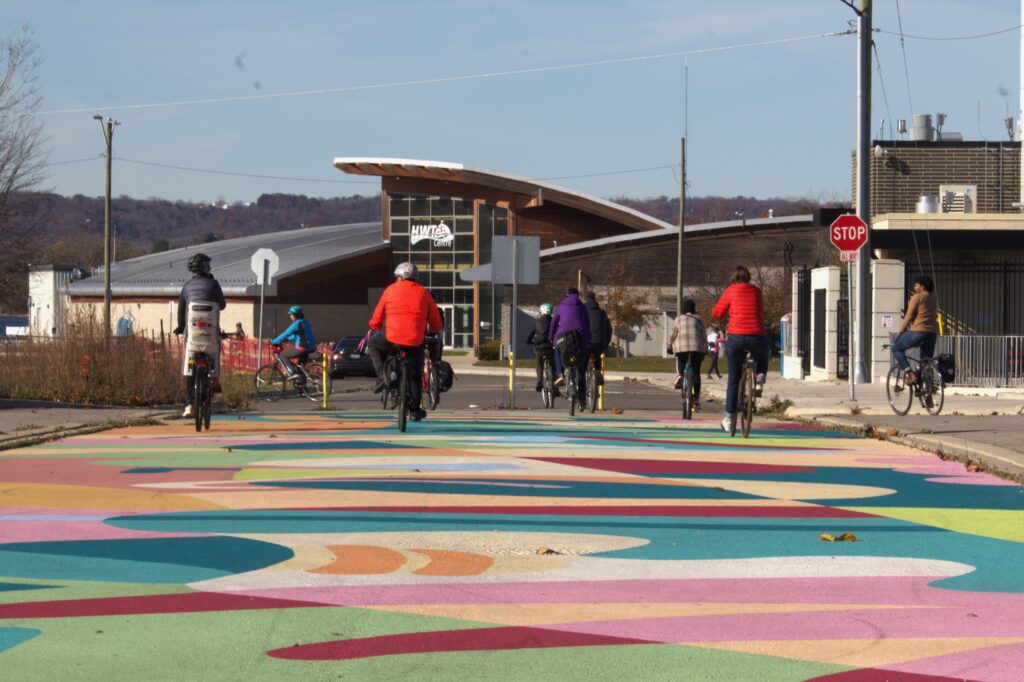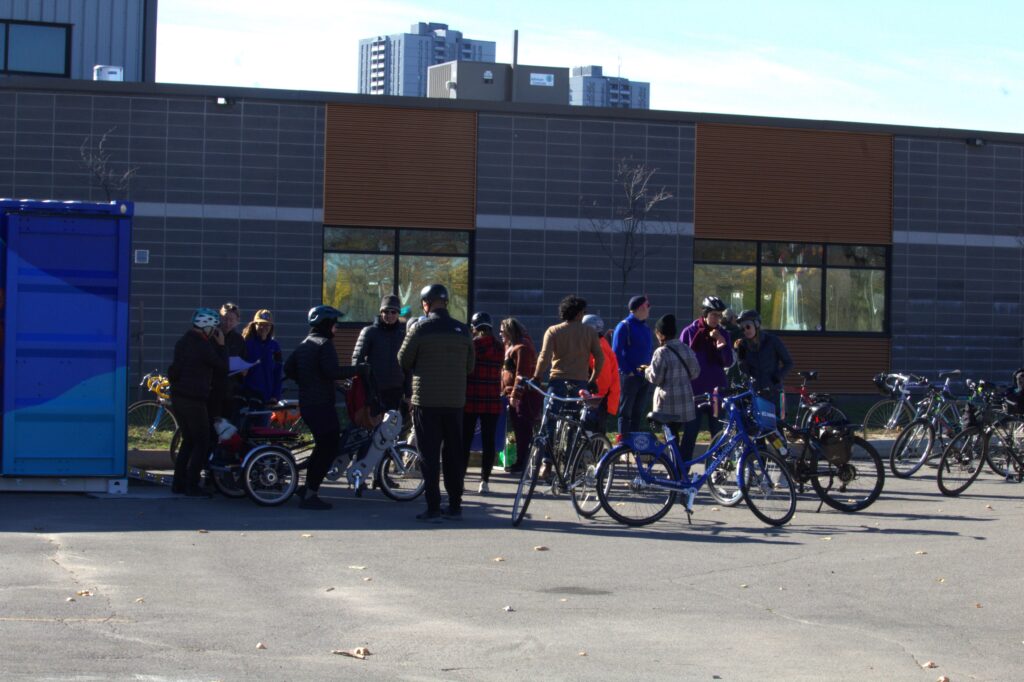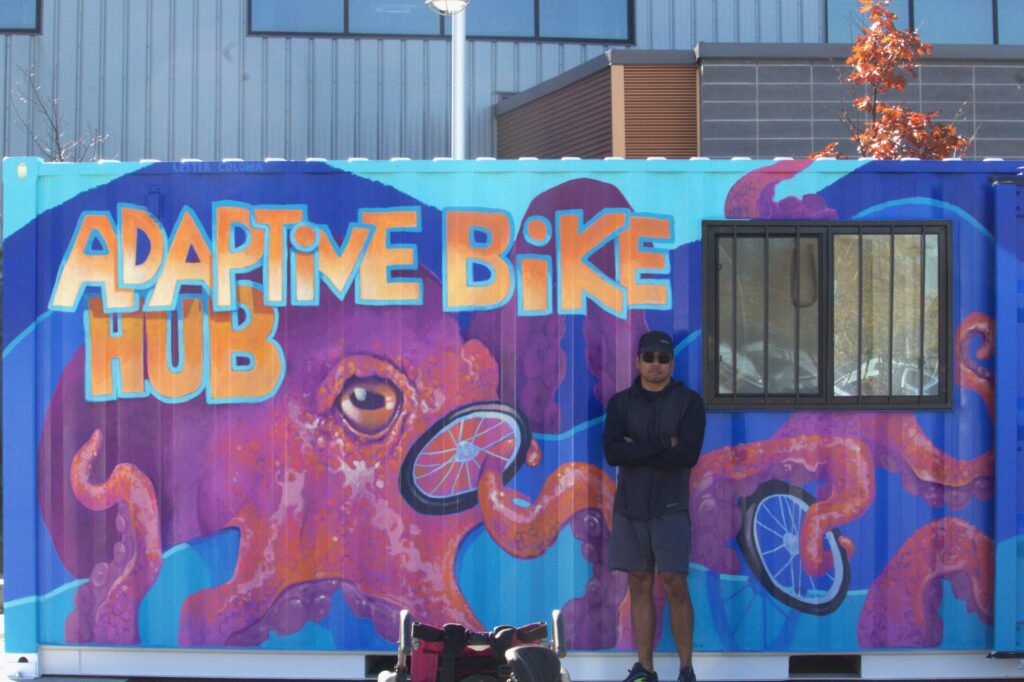The Hamilton Bike Share community ride across Hamilton ended with a reveal of the new Hamilton Harbour accessible bike hub
This article is a part of the Silhouette Photo-Journalism series.
The Everyone Rides Initiative's most recent community bike ride took participants on a tour of the city's murals as a celebration of public art. The ride took place on the morning of Nov. 16, 2024, starting at Corktown Park and ending at Hamilton Harbour. There, the new Bayfront Park Adaptive Bike Hub was unveiled, set to begin operation in April of 2025.
The Everyone Rides Initiative is an equity program within the Hamilton Bike Share organization that aims to remove barriers to accessing cycling as a mode of transportation. Their new adaptive bike hub will be the second-ever of its kind in Hamilton, with the first located in Gage Park.
Paul Copcutt, a participant of the ride explained that he attended to deliberately appreciate the murals. "I think the cool thing about Hamilton is that there are so many murals that people don't even notice," said Copcutt. The following is a documentation of some of the murals found along the ride.

At the corner of James Street North and Wilson Street, this breathtaking mural was the crowd favorite for the mural ride cyclists. Created by artists Alexander Bacon, Heiro, KWest and TukeOne.

Directly opposite from the pervious mural, a peregrine falcon, Hamilton's unofficial city bird can be seen painted at York Street. Pictured here are Abbie Little (left), Co-Chair for Cycle Hamilton and Olivia MacAskill (right), Community Engagement Manager at Hamilton Bike Share.
The artist Scott MacDonald, painted the outline and set up a QR code where the community could fill in the colours in any way they desired. He then picked his favourite submissions and asked the community to vote on which should be painted, resulting in the gorgeous green and blue bird.

This mural can be found at the corner of Walnut Street and Jackson Street tucked away in a parking lot, artist unknown.

This mural brought more aquatic themes to the ride as it drew closer to the harbour. Also tucked away in a parking lot, this wonderful mural was an extra stop for the riders as they approached the accessible bike hub

As the ride came to a close, this mural along the waterfront made for a scenic entrance into the harbour. Painted by Clear Eyes Collective.

Riders then collected at the harbour to try the new accessible bikes. Coffee and donuts were provided for the riders to celebrate the unveiling of the hub and discuss the murals.

Lester Coloma (pictured here) is the artist behind mural at the accessible bike hub at Hamilton Harbour. He said that painting this mural was a challenge due to the the weather but he was inspired by the nearby water.
"The whole idea for the octopus was for the theme of the water by the harbour," said Coloma. He is no stranger to murals and his work can be found across the city, including one depicting construction along Hess Street and between Barton and Cannon Street.

A recumbent bicycle (pictured here) is one of many accessible bikes offered by the hub. Others include tricycles, e-assist, dual and side-by-side tandem, hand cycle bicycles and recumbent bicycles (pictured here).
The variation allows for all to be able to feel the joy of cycling, part of the mission of the Everyone Rides Initiative. The hub will also be equipped with an array of modifications that can be added to the bikes, such as allowing a rider to reach the pedals more easily.
Riding an adaptive bike from the hub will be free and there will be staff at the hub to help riders have the best experience. Bikes can be rented for one hour at a time in order to ensure that each rider has the equipment that they need to enjoy cycling.
The Everyone Rides Initiative hosts many community rides that explore public art and interesting locations throughout Hamilton. Details are available on their website for you to see upcoming events and all that the city has to offer.
Rachel Katz often shares her cooking and baking with other people. After a time, people began to tell her that she should start a food blog. While Katz decided a blog would be too much to handle whilst being a full-time graduate student, she figured Instagram would be a manageable platform. So last summer while she was working one job and had relatively free evenings, she started her food Instagram, Fork in Progress.
On the account, Katz shares photos of the recipes that she’s tried. Unlike many other food accounts, her unfiltered photos project accessibility and make anyone scrolling feel like they could get in their kitchen and make the same meal.
The recipes that Katz tries are not necessarily easy, but she believes basic kitchen confidence can be applied to make more complicated recipes. She looks for recipes with very specific instructions that she can follow along with. She also looks for versatile recipes that she can add her own flavours to. In her captions, she highlights her innovations and provides tips.
One benefit to Instagram for her is the interactivity. It is easy for her followers to ask her questions and provide feedback. The platform also makes it possible for her to share step-by-step videos that break down the recipes into easier steps. This is to prove to people that anyone can learn how to cook delicious dishes.

“I was frustrated with a lot of students… saying ‘oh I have no time to cook’ or ‘I don't like cooking’… [But] food is so important, food is delicious and there's a kind of pride that you get from making your own food that you don't really get from anything else,” Katz said.
Katz understands how difficult balancing food with student life can be. The McMaster grad lived in residence in her first year where the meal plan limited the choice she had over what she ate. In her second year, she shared a six-person student house with a tiny kitchen. In both years, she didn’t feel like she had a fully functional space where she can cook her own meals.
For Katz, this resulted in patterns of disordered eating. In her second year, she committed to recognize these patterns in herself so she can create healthier eating habits. Preparing her own meals has been one tool in repairing Katz’s relationship with food.
In her third year, Katz moved into a two-person apartment with a nice kitchen. In her new kitchen, Katz explored cooking more. Working at the Silhouette also encouraged her as she began to regularly bake for the office. This practice allowed her to receive feedback on her food and grow as a baker.

“I don't use words like clean… or like detox, cleanse… [T]here are all of these other food bloggers out there who use those lines and a lot of recipe bloggers who have these crazy extravagant recipes. But there wasn't really anyone to fulfill the student niche for people who wanted to cook actual meals but didn't really know where to start,” Katz explained.
While developing a healthy relationship with food is important to Katz, food is also a tool that she uses in her relationships with others. Cooking is an activity that she likes to do with family and friends. Her food-related memories stretch all the way back to her childhood.
Katz grew up eating a lot of homemade meals. She is inspired by her mother, who is an accomplished home chef and baker. Not only does she adore the chocolate chip cookies that she grew up eating, but she also admires her mother’s diligence. Her mother can spend months trying to perfect a recipe.

Now an adult, Katz is making her own food memories, many of which include food she’s made for others. For her, cooking for people is a way of shaping their experiences for the better. By making a caramel corn cake for her partner’s birthday, she was able to make the day more memorable. When she makes her mother’s birthday cake this year, she will make that day more special.
However, as the name of her account indicates, Katz is still growing her skills in the kitchen. She wants her followers to continue learning, experimenting and trying new things.
“[H]aving a name that has associations of things that are not quite perfect, that I'm still learning but it doesn't mean that I don't know anything, I think… that embodies the mentality that I'm hoping I can encourage people to take with food and feeding themselves,” said Katz.
For this reason, Katz is not focused on monetizing Fork in Progress, as she and her followers operate within a student budget, she does not want to promote products that are inaccessible. While she would consider a column in a publication, she believes the account can only remain authentic by staying fairly small.
As long as she’s a student, Katz wants to continue spreading positive messages about food and cooking. She wants Fork in Progress to show students that they can make their own cakes and eat them too.
[thesil_related_posts_sc]Related Posts[/thesil_related_posts_sc]
By: Eden Wondmeneh
Consent education seems to always be an afterthought at McMaster University. The word “consent” is consistently thrown into events, seemingly out of place, with no elaboration, discussion or focus.
During Welcome Week, the word was plastered on posters that appeared at all the major events and was projected in vibrant colours on the big screen prior to the concert.
The way consent education was treated during Welcome Week foreshadowed how the subject would be addressed during the rest of the year: just enough to get a hypothetical participation award in disrupting trends of sexual violence but too little to make a legitimate impact on campus rape culture.
This culture is something that does not go unnoticed by those who are most likely to be targets of sexual violence. A late night food run is never complete without words of caution and offers of someone to walk with. It’s unfortunately not uncommon to walk with your keys in between your fingers.
Once when I was walking home, after parting ways with my group of friends, a male acquaintance yelled back, “Be careful! Campus rape culture is still a thing”.
To him I say, believe me, I know. There is rarely a moment, at a party or anywhere on campus during non-peak hours where my friends or I don’t feel discomfort, or even fear.
Following the news of sexual violence within the McMaster Students Union Maroons, this tension is especially high. Prospective Maroons are hesitant to submit returning applications and attending events run by or affiliated with the MSU is often met with a little more resistance.
The MSU’s response to the allegations and overall toxic campus culture has been dismal.
In the beginning of March, posters commissioned by the Ontario government were hung up in several residence buildings. It reads “If you are watching it happen, you are letting it happen. Consent is everything”.
This was the first attempt I noticed to address the importance of consent in my residence. Although this message is true and important, it being the only form of consent education on residence is frankly pathetic.
McMaster is not treating consent education as a major priority. Any educational materials, workshops or sessions produced or run by the MSU or its services are only accessible to those who actively seek out those learning opportunities. Even campaigns run by the Student Health Education Centre, while important, have limited reach.
Despite their value, consent education needs to reach beyond those populations to those who need it the most.
The issue of consent cannot be addressed on small poster in the basement of a residence building. Misconceptions or being ignorant to consent needing to be mutual, voluntary, informed and continuous directly results in continued sexual violence on campus.
In order to shift toxic campus rape culture, there needs to be open lines of discussion about consent that are inherent to the structure of Welcome Week, life on residence and campus life in general. These discussions need to be backed by action; posters and platitudes are not enough.
The nonchalant backburner approach to consent education fails to create an inclusive and safe community for all students.
[thesil_related_posts_sc]Related Posts[/thesil_related_posts_sc]
By: Tanvi Pathak
In March, McMaster Students Union is slated to release its second annual municipal budget submission to Hamilton city council.
According to Shemar Hackett, the MSU associate vice president (Municipal Affairs), the budget submission will prioritize transit, student housing, student employment, bylaws and enforcement and lighting.
After consulting students and reviewing data from The Your City survey, the MSU decided these key areas were ones that stood out as issues that needed immediate attention.
The committee’s decision to focus on these areas is also linked to the rising demand for off-campus housing.
According to Andrew Parashis, a property manager at Spotted Properties, the largest property management in the McMaster community, demand for student housing has soared in recent years.
Parashis notes that with the increase of local and international students attending McMaster, the waiting list for students seeking accommodations through Spotted Properties has tripled in the last year alone.
The municipal budget submission will also focus on accessible employment opportunities.
The union’s education department and municipal affairs committee’s recommendations aim to offer proactive solutions for each issue and improve Hamilton’s attractiveness to students and recent McMaster grads.
One of the committee’s recommendations is for the city of Hamilton to implement a lighting audit across Ward 1.
Hackett emphasized that there are neighborhoods off-campus substantially lacking in visibility. As a result, many students do not feel comfortable walking home late at night after classes.
A lighting audit would reduce these issues in these neighborhoods and identify priority locations for new street lights.
The committee reached out to the Ward 1 councilor Maureen Wilson, who was receptive to the committee’s recommendation and is confident that the proposal will be valuable to McMaster and Ward 1.
Another recommendation calls for city council to move forward with the landlord licensing project discussed in December.
Hackett and Stephanie Bertolo, MSU vice president (Education), articulated their stance on landlord licensing to Ward 8 city councilor Terry Whitehead, who sits on the Rental Housing sub-committee.
Since then, the motion to implement a pilot project was brought to council and endorsed by many councilors.
Prior to the development of the budget submission, the committee consulted city officials.
The committee plans to continue to meet with the city staff and councillors to push for their recommendations and make them a priority for the council.
Thus far, they have met with Terry Cooke, CEO of the Hamilton Community Foundation, to discuss student engagement and retention and the ways in which organizations can support one another in the future.
The municipal affairs committee has also been successful in implementing its Landlord Rating system, a platform developed by the MSU education department.
The landlord licensing project, which the committee has also been lobbying for, got the Hamilton city council rental housing sub committee’s stamp of approval and will be put forth into discussion during the next city council meeting.
“The council has been extremely receptive to all our points about the agreements we put forth,” said Hackett, adding that the MSU budget submission has proven to be a valuable resource for lobbying municipal stakeholders.
Over the next few weeks, the municipal affairs committee will meet with city councilors and community stakeholders to advocate for their budget submission proposals.
[thesil_related_posts_sc]Related Posts[/thesil_related_posts_sc]
By: Michael Running
Most of us take time for granted. Whether you’re talking about the 10 minutes you have to move from class to class or the hour and a half you’re given to write your midterm, few people are actually cognizant of its value.
This past week, the MSU hosted Maccess, a campaign held on campus to raise awareness for the issues faced by McMaster students living with different forms of disability. These students are especially aware of how important their time is, and one of the main goals of the campaign was to help others understand the struggles that they face on a daily basis. These struggles include not having enough time to reach their next class due to obstacles like stairs or snow-covered sidewalks in the winter, dealing with a mental disability or illness that requires having to seek accommodations for more time on tests or extensions on assignments and having to wait over a month to get an appointment with Student Accessibility Services for the aforementioned accommodations.
Maccess attempted to raise awareness for these issues through activities including chalking off areas around campus to demonstrate the level of accessibility, holding training sessions where students could learn sign language or how to be a sighted guide, hosting a presentation and discussion on mental health, and even an event called “Accessible Perspective” that put able-bodied people in wheelchairs in an attempt to demonstrate the difficulties one could face moving around campus.
VP (Education) Spencer Nestico-Semianiw, was one of the driving forces behind the campaign. “We wanted to have a very holistic campaign that tried to highlight a variety of different disabilities to make students more aware of the challenges on campus,” said Semianiw.
However, some people questioned the direction that the campaign took. Sarah Jama, the Ontario Director for the National Educational Association of Disabled Students and a McMaster student, stated, “I think there were pros and cons to the Maccess Campaign. I love the interactive map concept because it was tangible and works to better the lives of people with disabilities on campus.”
Jama was conflicted over events like Accessible Perspective. “What I questioned were the various simulations that [catered] to people without disabilities that were intended to give them a feel for what it was like to have a disability... The main focus here should be that everyone, no matter your ability, deserves to learn and experience a barrier-free environment,” she explained.
While Semianiw acknowledged that there were concerns about running these events, he felt it was important because it provided a snapshot for students and staff at the university to gain some understanding of the struggles students may be facing. “We wanted it to be something where we actually have the university be able to see how accessibility affects students.”
He also mentioned that they facilitated a session with Sean Van Koughnett, McMaster’s Associate Vice President and Dean of Students. “These are the decision-makers that we want to have a very good understanding of these problems because they’re the ones ideally who are going to be looking at funding or looking at decision-making that improves accessibility on campus,” he said.
Regardless of whether or not they approached the topic from the right perspective, the campaign garnered considerable attention. Days after the campaign’s conclusion, at this Sunday’s SRA meeting, the Assembly voted in favour of launching a full-flegded, official service with the same name. The service will function as a peer support network for students with disablities. Although the campaign and the launch of the service are not directly linked, this decision indicates that the campaign is just the beginning of long-term advocacy efforts for increased accessibility on campus.
Photo Credit: Mike Beattie